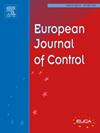线性离散时间系统的输出反馈积分滑模预测控制
IF 2.5
3区 计算机科学
Q2 AUTOMATION & CONTROL SYSTEMS
引用次数: 0
摘要
本文针对状态无法测量的线性离散时间系统,提出了一种新的输出反馈积分滑动模型预测控制(OF-ISMPC)策略,避免了对状态观测器的使用。所提出的 OF-ISMPC 既能确保较强的鲁棒性,又能使被控系统达到最佳性能。输出反馈积分滑模控制(OF-ISMC)的作用是补偿任何匹配干扰。输出反馈鲁棒模型预测控制(OF-RMPC)的作用是解决带有约束条件的优化问题。此外,通过将积分滑动面定义为最优投影矩阵的函数,可减少非匹配干扰对系统的影响。证明了闭环系统的输入到状态实际稳定性。最后,还提供了数值模拟和实验结果,以验证所提方法的有效性。本文章由计算机程序翻译,如有差异,请以英文原文为准。
Output feedback integral sliding mode predictive control for linear discrete time systems
In this paper, a new output feedback integral sliding model predictive control (OF-ISMPC) strategy is proposed for linear discrete-time systems when the states are unmeasured, which avoids the utilization of a state observer. The proposed OF-ISMPC can ensure strong robustness while at the same time achieving optimal performance of the controlled system. The role of the output feedback integral sliding mode control (OF-ISMC) is to compensate for any matched disturbances. The role of the output feedback robust model predictive control (OF-RMPC) is to solve the optimization problem with constraints. Moreover, the impact of unmatched disturbances on the system is reduced by defining the integral sliding surface as a function of an optimal projection matrix. The input-to-state practical stability for the closed-loop system is proved. Finally, numerical simulations and experimental results are provided to validate the effectiveness of the proposed approach.
求助全文
通过发布文献求助,成功后即可免费获取论文全文。
去求助
来源期刊

European Journal of Control
工程技术-自动化与控制系统
CiteScore
5.80
自引率
5.90%
发文量
131
审稿时长
1 months
期刊介绍:
The European Control Association (EUCA) has among its objectives to promote the development of the discipline. Apart from the European Control Conferences, the European Journal of Control is the Association''s main channel for the dissemination of important contributions in the field.
The aim of the Journal is to publish high quality papers on the theory and practice of control and systems engineering.
The scope of the Journal will be wide and cover all aspects of the discipline including methodologies, techniques and applications.
Research in control and systems engineering is necessary to develop new concepts and tools which enhance our understanding and improve our ability to design and implement high performance control systems. Submitted papers should stress the practical motivations and relevance of their results.
The design and implementation of a successful control system requires the use of a range of techniques:
Modelling
Robustness Analysis
Identification
Optimization
Control Law Design
Numerical analysis
Fault Detection, and so on.
 求助内容:
求助内容: 应助结果提醒方式:
应助结果提醒方式:


